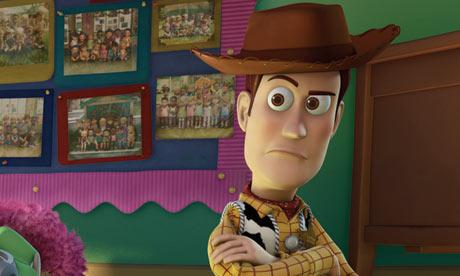 All of Pixar’s Toy Story movies capture the same narrative that many of my kids’ books tell. It’s a story told and retold again and again in children’s literature–and I bet that if I was more of a student I could find evidence that it’s told in other genre’s and realms of literature as well.
All of Pixar’s Toy Story movies capture the same narrative that many of my kids’ books tell. It’s a story told and retold again and again in children’s literature–and I bet that if I was more of a student I could find evidence that it’s told in other genre’s and realms of literature as well.
Here’s the theme: who care’s about Mr. Potato Head? Who cares about Slinky? It’s all about Woody. It’s all about the important doll or toy that has lost his position of prominence. Who cares about the fact that Woody has been dominating the toy pyramid for years, that Mr. Potato Head has never had a prominent place in the hierarchy of Andy’s love–the fact of the matter is that we absolutely do not want Woody to lose HIS place. When Woody loses HIS place we all grieve and seek proper restitution. It’s all about getting the top toy/doll back into it’s place of prominence. Only then do we feel like the story has its proper ending.
Right?
I could list you title after title of children’s books that tell this same story. We hate when loss is experienced…even if it is loss that does nothing more than allow that character to experience what virtually every single other character in the narrative is, has, and will experience. Everyone else knows what it feels like to be kicked off the bed. All the other toys get it…and we don’t care. We only care that the dominate toy is now experiencing pain in a new way…and we grieve with him/her through their pain. No body was grieiving the fact that the Slinky dog wasn’t on Andy’s bed at the end of the day. Nope. We grieve Woody’s loss. Slinky had so little to lose…so who really cares right?
What is this phenomenon? Is it that we don’t like watching people experience loss? Is it that we’re simply uncomfortable with it, with the grief and pain it brings? Is there truth to the idea that we don’t like the implications it might have for ourselves–that those of us with control or power in our world fear losing it? Because what intrigues me most is that this is a storyline that in many areas we adamantly stand up against. We tend to love the traditional Disney storyline of a down-and-out sports team that overcomes all obstacles and becomes a winner. We love underdogs, we love rags to riches stories, we love that narrative because it gives us hope. Right?
But, strangely, I’m realizing (and attempting to articulate) that we also love this alternative narrative that itches that spot in the middle of our back that we can rarely reach. There’s a secret tickle back there of which we rarely speak of–a tickle that we crave to be itched even if it’s no good for us (clearly my itchy metaphor doesn’t work so well). We love underdogs because we want to be the underdog that overcomes…but more often than not we are NOT the underdog. More often than not we are Woody, we’re the toy with privilege and power who is terrified of losing it. And virtually all of us hate change!
because change always brings loss
and loss always brings some level of pain
and pain reminds us of our brokenness
and brokenness reminds us of our vulnerability
and vulnerability reminds me that I don’t have control
Is this why at church we sing “praise and worship” songs so readily while avoiding songs of grief and lament? Is this why we celebrate the young instead of the old? Is this why we have so little room to talk about brokenness less it cheapen our conversation on health?
Is it because we want to avoid anything that reminds us that we just might not be the underdog–we may, God forbid, be Woody–we may be living in fear of losing the system or structures of power that have long given us the identity that we need desperately desire. And if we lose that…well…if we lose that then we just might have to face a level of pain, discomfort, and change that…God forbid, will bring us face to face with our vulnerability, our brokenness, and the actual truth that we do not have control over our lives as we once thought we did…and that freaks me…no, wait, I mean you out.

 There are some pretty awesome things about having a Foley catheter, i.e., about having a bag of my own urine constantly strapped to my leg.
There are some pretty awesome things about having a Foley catheter, i.e., about having a bag of my own urine constantly strapped to my leg. Much of what Jessica and I have been invited to live into with regard to cancer and community is the task of affirming the awkwardness that necessarily exists between us and you.
Much of what Jessica and I have been invited to live into with regard to cancer and community is the task of affirming the awkwardness that necessarily exists between us and you.